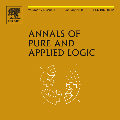Arbitrary public announcement logic (APAL) reasons about how the knowledge of a set of agents changes after true public announcements and after arbitrary announcements of true epistemic formulas. We consider a variant of arbitrary public announcement logic called positive arbitrary ublic announcement logic (PAPAL), which restricts arbitrary public announcements to announcement of positive formulas. Positive formulas prohibit statements about the ignorance of agents. The positive formulas correspond to the universal fragment in first-order logic. As two successive announcements of positive formulas need not correspond to the announcement of a positive formula, PAPAL is rather different from APAL. We show that PAPAL is more expressive than public announcement logic PAL, that it is incomparable with APAL, and we provide a sound and complete infinitary axiomatisation.
翻译:任意公开宣布逻辑(APAL) 关于在真实的公开宣布和任意宣布真正的缩写公式之后对一组代理人的了解如何变化的任意公开宣布逻辑(APAL) 关于在真实的公开宣布和任意宣布真正的缩略语公式之后如何变化的任意公开宣布逻辑(APAL) 关于对一组代理人的了解的任意公开宣布逻辑(APAL) 关于在真实的公开宣布和任意宣布真正的缩略语公式之后如何变化的任意公开宣布逻辑(PAPAL) 关于对一系列代理人的了解的任意公开宣布逻辑(APAL) 关于公开宣布积极模式的任意宣布逻辑(PAPAL) 关于任意宣布积极宣布逻辑(PAPAL), 将任意公开宣布的逻辑(PAPAL) 视为对宣布积极公式的任意宣布; 积极公式禁止关于代理人无知的言论; 积极公式与一级逻辑中的普遍片段相对应; 由于连续连续两次宣布的肯定公式并不与宣布积极公式相对应,PAPAL 与APAL 相当。



